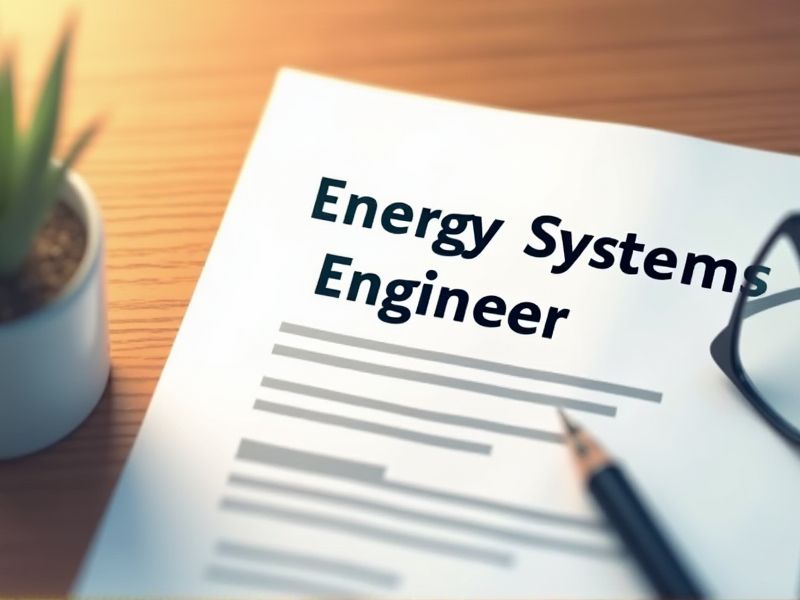
Energy systems engineers play a crucial role in the design, implementation, and maintenance of energy-efficient technologies and infrastructures. Certifications provide these engineers with the specialized knowledge and recognized credentials necessary to ensure industry-standard compliance and technical proficiency. As energy technologies evolve, staying updated through certifications becomes essential for engineers to remain competitive and effective in their roles. Here are some important certifications required for an energy systems engineer.
Professional Engineer (PE)
Having a Professional Engineer (PE) license for an Energy Systems Engineer ensures adherence to safety and regulatory standards, which is critical for the reliable operation of energy systems. The PE license signifies a recognized level of expertise, enhancing the credibility and trust in engineering solutions developed, which is crucial for stakeholders. With complex energy projects often involving significant financial investments, a PE-certified engineer minimizes risks and improves project accountability. In many jurisdictions, a PE is required to approve engineering plans and designs, ensuring compliance with local laws and regulations.
Certified Energy Manager (CEM)
A Certified Energy Manager (CEM) enhances the credibility of an Energy Systems Engineer by affirming their expertise in energy management and efficiency. The certification ensures the engineer stays updated with the latest best practices and technologies in the energy sector. Many organizations require or prefer a CEM-certified professional when hiring for roles focused on optimizing energy usage and reducing costs. CEM certification provides a standardized measure of competence, often leading to enhanced career opportunities and professional growth for the engineer.
LEED Accredited Professional (LEED AP)
LEED Accreditation equips an Energy Systems Engineer with a structured understanding of sustainable building practices, which enhances their ability to design environmentally efficient systems. Gaining LEED AP status signifies an engineer's competence in aligning energy projects with global sustainability standards, increasing their credibility and marketability. An engineer with LEED expertise can better navigate the intricate requirements of green building certifications, thereby improving project outcomes and client satisfaction. Understanding LEED principles aids in optimizing energy efficiency, which is crucial for reducing operational costs and environmental impact.
Certified Energy Auditor (CEA)
A Certified Energy Auditor (CEA) provides essential expertise in identifying energy inefficiencies, which directly enables an Energy Systems Engineer to design more effective systems. By analyzing energy consumption patterns, CEAs supply critical data that guides engineers in optimizing system performance. The collaboration with a CEA ensures compliance with energy regulations, reducing the risk of project delays or penalties for engineers. Involving CEAs in the engineering process enhances the long-term sustainability of energy projects by prioritizing and implementing efficiency improvements.
Project Management Professional (PMP)
Energy Systems Engineers often manage complex projects that require coordinating multiple teams, which PMP certification can enhance by providing advanced project management skills. Delays or oversights can lead to increased costs and energy inefficiencies, so having PMP-trained engineers helps in mitigating these risks through structured methodologies. The energy sector faces frequent regulatory changes; PMP knowledge aids in effectively updating and aligning project goals and timelines with compliance standards. Employers in the energy industry recognize PMP as a mark of professional competency, often resulting in improved career prospects and project outcomes for engineers with this credential.
NABCEP Photovoltaic (PV) Installation Professional
Energy Systems Engineers benefit from NABCEP Photovoltaic (PV) Installation Professional certification as it validates their competence in solar panel installation, ensuring quality and safety standards. This certification can enhance credibility, making them more attractive to employers and clients who prioritize certified professionals. Market demand for solar installations continues to increase, necessitating specialists with verified skills to meet industry needs. The NABCEP credential also helps engineers stay current with technological advancements and regulatory changes in the solar sector.
Certified Building Commissioning Professional (CBCP)
Having a Certified Building Commissioning Professional (CBCP) on the team ensures that all energy systems are optimized for efficiency and performance, resulting in cost savings for building operations. The CBCP provides expert validation and verification of system performance, reducing the risk of operational failures and unnecessary maintenance. This certification also brings advanced knowledge of building codes and standards, crucial for regulatory compliance and risk management. Employing a CBCP enhances a project's credibility and can lead to increased stakeholder confidence and investment.
Certified Measurement & Verification Professional (CMVP)
Obtaining a CMVP certification equips an Energy Systems Engineer with the necessary skills to accurately assess energy savings, which leads to trustworthy results. This certification establishes credibility and trust within the industry, benefiting both engineers and their clients. Integrating CMVP standards enables engineers to apply internationally recognized best practices, enhancing project outcomes. Accurate measurement and verification reduce the risk of project failures, thus increasing the overall efficiency and reliability of energy systems.
Certified Renewable Energy Professional (REP)
A Certified Renewable Energy Professional (REP) equips an Energy Systems Engineer with specialized knowledge in sustainable energy practices, leading to more effective and efficient system designs. It demonstrates commitment to industry standards, which may enhance credibility and trust with clients and stakeholders. With energy consumption patterns increasingly shifting towards renewables, an REP certification ensures an engineer stays relevant in a rapidly evolving field. Employers often prioritize candidates with specialized certifications, potentially leading to better job prospects and career advancement opportunities.
Building Energy Modeling Professional (BEMP)
Building Energy Modeling Professionals (BEMPs) provide accurate simulations of energy consumption, which help energy systems engineers design efficient systems tailored to specific building needs. Their expertise allows engineers to predict energy performance and costs, enabling more informed decision-making. With BEMPs, engineers can identify inefficiencies in building designs and recommend optimizations, enhancing overall energy efficiency. Their use of advanced modeling tools facilitates compliance with regulatory standards, ensuring projects meet sustainability criteria.
Summary
When you, as an Energy Systems Engineer, obtain certifications, your professional credibility and marketability increase. The specialized skills and updated knowledge acquired can lead to enhanced job performance. Employers often seek certified professionals, potentially resulting in more job opportunities and higher salary prospects for you. Ultimately, these certifications can position you as a leader in sustainable energy solutions.
